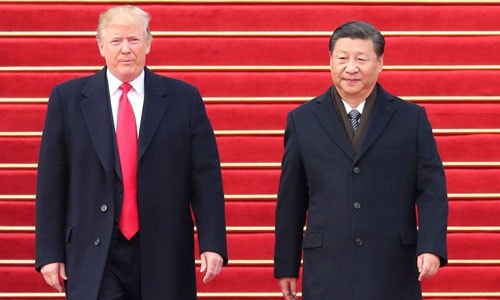China's strategies to deal with the US in the trade war
Making it difficult for goods to clear customs and stirring up nationalism is China's strategy in addition to retaliatory tariffs against the US.
|
Chinese President Xi Jinping (Right) welcomed US President Donald Trump to visit Beijing in 2017. Photo:Reuters. |
When Trump announced a second round of tariffs on $200 billion worth of Chinese goods, Beijing responded by imposing tariffs on an additional $60 billion worth of goods from Washington, leading many to believe that the country's leaders had run out of cards in their fight with US President Donald Trump amid a fierce trade war. However, some experts say this is a misconception and that China still has plenty of weapons in its arsenal to confront the US on trade.
Economists ofBloombergTrump’s tariffs are only meaningful if they make Chinese goods lose their low-cost advantage over those made in the United States.
Tiffany Zarfas Williams, owner of a fashion handbag store in Texas, said 84% of her inventory comes from China and much of it is subject to Trump’s 10% tariff. Her largest supplier has raised prices and she has no choice but to pass the cost on to customers, according toCNN.
This reality shows that consumers are paying more and American businesses are losing profits in the trade war, even though Trump has repeatedly stated that China is the loser in the tariff imposition and that this will "bring a lot of money" to the US treasury.
So no matter how many Chinese imports Trump imposes tariffs on, if those products are not produced domestically, consumers will still have to pay more for them. As long as Americans continue to buy Chinese goods at higher prices, Beijing will have the incentive to "fight to the end."
China’s leaders knew from the start that they could not match the US in a tit-for-tat tariff-for-tat manner, and that this was not part of their long-term strategy. They thought it wiser to wait patiently until Trump’s tariffs began to bite into Americans’ wallets, while they could still produce their own goods or find other sources to replace US imports.
Tariffs are not the only trade move China can make against the US. Chinese customs have started to increase inspections of fresh meat, vegetables and fruits imported from the US since mid-year. Luis Chein, China branch director of WH Group, the world's largest pork producer and owner of the Smithfield Foods chain in the US, complained that Chinese customs have recently inspected every shipment of pork imported from the US, instead of randomly checking as before, according toSCMP.
|
Chinese customs officers inspect imported pork at a customs checkpoint. Photo:SCMP. |
This causes imported pork from the US to stay at the port longer. In addition to pork, many other fresh products are also subject to strict inspections when clearing customs, including fruits and seafood. The long stay at the port causes these products to lose quality, even past their expiration date, making Chinese consumers no longer interested in them. Instead, they can buy imported products from other countries, or domestic products.
China has recently significantly reduced its imports of soybeans from the US and is looking for supplies from other countries. This move has greatly affected US soybean farmers and they need government support.
Another tactic China can use against American businesses doing business with them is to introduce complex and cumbersome processes and paperwork that make it nearly impossible for these businesses to make a profit in China.
According to international commentator Adam Fayed, another weapon that China holds in the trade war with the US is nationalism, fueled by Beijing's advantage in controlling the media system.
With the booming economy and the concept of the "Chinese Dream" advocated by President Xi Jinping, the Chinese people are increasingly inclined towards nationalism. China under Xi has abandoned the strategy of "hiding its strength and biding its time", openly declaring its ambition to become the world's leading power by the middle of the 21st century.
“The message that Chinese media has been sending out for years is that China is rising and will dominate Asia, but the US and Japan are trying to contain it,” Fayed wrote. “The Chinese believe that they are being threatened by outside forces.”
This nationalism may help the Chinese people "bite the bullet" to bear the negative impact of Trump's tariffs, especially if the trade war is likely to drag on. It also helps the country's leaders gain public support for taking a tough stance and "retaliating" against Trump's attacks.
But nationalism can also spiral out of control and erupt into unpredictable waves of violence. China’s leaders certainly don’t want to see people burning down American cars, as happened to Japanese brands during the 2012 protests. That could be a disaster that could have dire international consequences for China.



